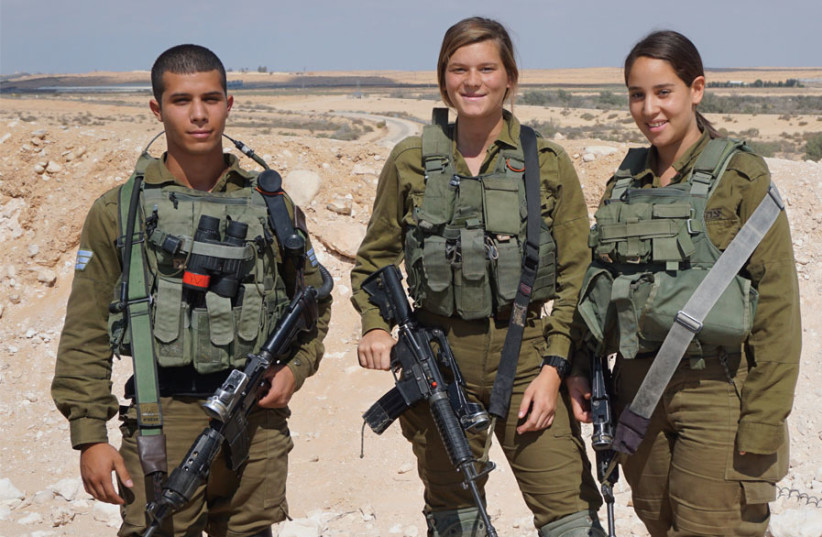The first mixed-gender combat battalion guarding the West Bank seam line will be going operational in the coming weeks.
Leading into this move and after extensive training, the IDF on Wednesday announced the promotion of the IDF Panther Battalion’s male commander, and The Jerusalem Post interviewed the female commander of the battalion’s second platoon.
The first commander of the Panther Battalion, Aviv Ohana, was promoted on Wednesday from the rank of major to lieutenant-colonel by OC IDF Central Maj.-Gen. Yehuda Fuchs.
Upon his promotion, Ohana said: “I am excited to continue on my path, as part of the family of the border protection forces, as the first to lead the Panther battalion, which constitutes yet another proof of the importance of the mixed female-male combat units on the borders, which are making significant daily achievements on the different fronts.”
“I see major importance in the service of women in mixed combat battalions and am excited to fulfill the operational concept and to strengthen the defenses on the border for the Judea and Samaria Division,” he said.

Developing the mixed female-male combat battalion in the West Bank
The Panther Battalion’s mixed-gender concept was developed when IDF General Staff strategically decided it needed a larger percentage of its soldiers operating in the West Bank to be active-duty soldiers as opposed to reservists, who jump in and out of their military duties on a frequent basis.
The focus of the battalion is the West Bank seam line near the Ephraim region, and it will begin regular operations in the coming weeks.
The battalion was formed after mixed-gender combat battalions on other borders have been viewed as successes.
The Post spoke to IDF Capt. Ofir Elimelech about her role as one of Ohana’s top deputies in the battalion.
She said she had previously filled various roles in the Jordan Valley for five years, including as a platoon deputy commander.
At one point, when Elimelech was taking a temporary break from the army, “they called me and asked me to join the battalion. I fully embraced the idea,” which meant “fulfilling a dream.”
The IDF moved various soldiers from its 03 lighter-intensity track to a more intensive infantry 06 track after about six weeks of training.
Asked whether the mixed-gender combat unit was ready for the full dangers of West Bank terrorism, Elimelech said: “We are really waiting for this. We have very high-quality soldiers and will go in full throttle. Everyone has lots of desire and motivation [to succeed], to guard the border as needed and to fulfill all of our designated missions.”
Pressed further about fears of losing female and male soldiers under her command in combat, she said: “We chose this role as a combat fighter. All of the fronts take on danger. We try to look out for our soldiers and hope they will come back healthy at the end. I cannot say if there are fears, but whatever our job is, we must do it the best we can.”
Elimelech said some of the soldiers under her command have been in gunfights before, whereas others have not. Nevertheless, she said she did not see a significant difference in their performance levels.
Regarding female versus male combat fighters, she said: “Everyone is at the same level. There is no difference, no gap. From their drafting for the unit, everyone does the same jobs and does them together. There is no separation. In operations, there is nothing the men can do that the women cannot. Everything is equal.”
Although Elimelech viewed women and men as equal combat fighters, she said there was still clear separation between them for the purposes of sleeping quarters and bathroom facilities, as set down by IDF regulations. Physical separations make it clear where the boundaries are, she added.
Looking into the future, Elimelech said it was “good and correct” to enable women to join an increasing number of infantry, air force and naval units. She said this would “cause even more women to perform better than anyone expects.”
Acknowledging that there are still certain IDF Special Forces units where women are not allowed, she said this could also change in the future. As there are more women in combat units in general, the greater female populations who could join combat units will improve their readiness and eventually, there would be women who will “up their game” enough to make it into top units, Elimelech said.
